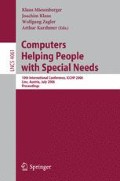Abstract
In the present work an electronic panel designed for helping people with deficiencies in their understanding of the sense of time is showed. The device will be installed in special education classrooms. It tries to meet the following objectives: 1) To provide disabled people with temporal orientation and to help in learning the use of conventional clocks. 2) To make the concept of temporal grouping easier. The grouping mechanism reflects the ability to use the information about task or work at some point correlated with temporal indicators. 3) To make anticipation of the sequence of events possible for autistic children. The results of the device’s evaluation will allow authors to improve the design. Thus, it could be possible to extrapolate the use of the device on homes for disabled children or for elderly people with cognitive disabilities or even in the early stages of senile dementia.
Access this chapter
Tax calculation will be finalised at checkout
Purchases are for personal use only
Preview
Unable to display preview. Download preview PDF.
References
ISO 9999: Technical aids for persons with disabilities. Classification and terminology (2002)
Web side of CERTEC – Center for Rehabilitation Engineering Research Lund Institute of Technology (Last visit January 2006), http://www.certec.lth.se/doc/certecscore/
Web side of Handitek (developing assistive technology for people with cognitive disabilities based on their cognitive abilities) (Last visit January 2006), http://www.handitek.se/english.htm
Web side of Alborada (Last visit January 2006), http://centros6.pntic.mec.es/cpee.alborada/
IEC 61000-6-3: Electromagnetic compatibility (EMC) – Part 6: Generic standards – Section 3: Emission standard for residential, commercial and light-industrial environments
IEC 61000-6-1:2005. Electromagnetic compatibility (EMC) – Part 6–1: Generic standards – Immunity for residential, commercial and light-industrial environments
IEC 6959-1:2001. Information technology equipment – Safety – Part 1: General require-ments
ISO/IEC 9126-1:2001. Software engineering – Product quality – Part 1: Quality model
ISO/IEC 14598-2:2000(E). Software engineering – Product evaluation – Part 2: Planning and management
ISO/IEC 14598-1:1999(E). Software engineering – Product evaluation – Part 1: General overview
Author information
Authors and Affiliations
Editor information
Editors and Affiliations
Rights and permissions
Copyright information
© 2006 Springer-Verlag Berlin Heidelberg
About this paper
Cite this paper
Falcó, J.L., Muro, C., Plaza, I., Roy, A. (2006). Temporal Orientation Panel for Special Education. In: Miesenberger, K., Klaus, J., Zagler, W.L., Karshmer, A.I. (eds) Computers Helping People with Special Needs. ICCHP 2006. Lecture Notes in Computer Science, vol 4061. Springer, Berlin, Heidelberg. https://doi.org/10.1007/11788713_121
Download citation
DOI: https://doi.org/10.1007/11788713_121
Publisher Name: Springer, Berlin, Heidelberg
Print ISBN: 978-3-540-36020-9
Online ISBN: 978-3-540-36021-6
eBook Packages: Computer ScienceComputer Science (R0)

